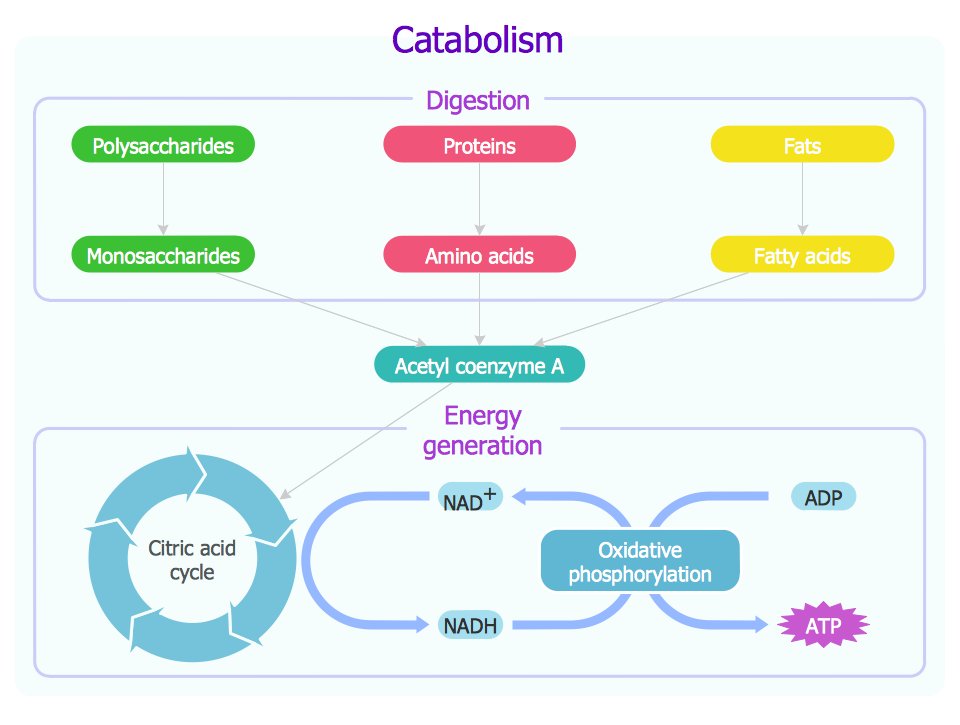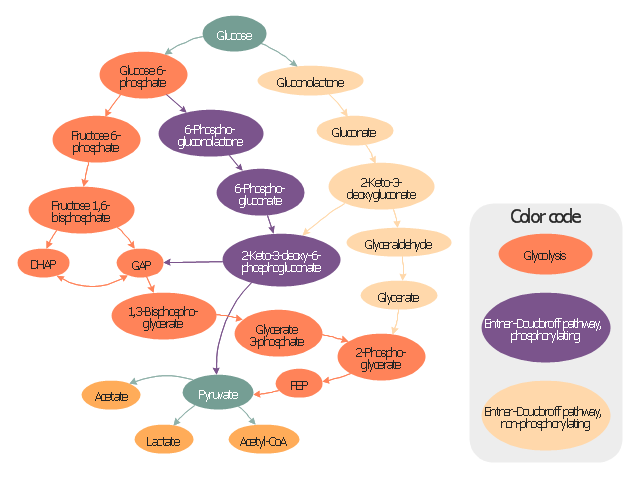 Biology
Biology
Biology solution extends ConceptDraw PRO software with samples, templates and libraries containing biological vector symbols, to help you create scientific and educational designs in the field of biology.
Biology Drawing
It is impossible to imagine the biology science without drawings. Drawings are very convenient way to explain the different biological knowledge and processes. If you dream to design any biology drawing quick and easy – the ConceptDraw PRO software is exactly what you need. ConceptDraw PRO diagramming and vector drawing software extended with Biology solution from the Science and Education area offers the useful tools for easy biology drawing."Carbohydrate catabolism is the breakdown of carbohydrates into smaller units. Carbohydrates literally undergo combustion to retrieve the large amounts of energy in their bonds. Energy is secured by mitochondria in the form of ATP.
There are several different types of carbohydrates: polysaccharides (e.g., starch, amylopectin, glycogen, cellulose), monosaccharides (e.g., glucose, galactose, fructose, ribose) and the disaccharides (e.g., maltose, lactose).
Glucose reacts with oxygen in the following redox reaction, C6H12O6 + 6O2 → 6CO2 + 6H2O, the carbon dioxide and water is a waste product and the chemical reaction is exothermic.
The breakdown of glucose into energy in the form of molecules of ATP is therefore one of the most important biochemical pathways found in living organisms." [Carbohydrate catabolism. Wikipedia]
This glucose catabolism pathways map shows glycolysis by orange color, Entner-Doudoroff phosphorylating pathway by green color, Entner-Doudoroff non-phosphorylating pathway by Yellow color.
This methabolic pathway map was redesigned from Wikimedia file: Glucose catabolism pathways.svg. [commons.wikimedia.org/ wiki/ File:Glucose_ catabolism_ pathways.svg]
The biochemical diagram example "Glucose catabolism pathways map" was created using the ConceptDraw PRO diagramming and vector drawing software extended with the Biology solution from the Science and Education area of ConceptDraw Solution Park.
There are several different types of carbohydrates: polysaccharides (e.g., starch, amylopectin, glycogen, cellulose), monosaccharides (e.g., glucose, galactose, fructose, ribose) and the disaccharides (e.g., maltose, lactose).
Glucose reacts with oxygen in the following redox reaction, C6H12O6 + 6O2 → 6CO2 + 6H2O, the carbon dioxide and water is a waste product and the chemical reaction is exothermic.
The breakdown of glucose into energy in the form of molecules of ATP is therefore one of the most important biochemical pathways found in living organisms." [Carbohydrate catabolism. Wikipedia]
This glucose catabolism pathways map shows glycolysis by orange color, Entner-Doudoroff phosphorylating pathway by green color, Entner-Doudoroff non-phosphorylating pathway by Yellow color.
This methabolic pathway map was redesigned from Wikimedia file: Glucose catabolism pathways.svg. [commons.wikimedia.org/ wiki/ File:Glucose_ catabolism_ pathways.svg]
The biochemical diagram example "Glucose catabolism pathways map" was created using the ConceptDraw PRO diagramming and vector drawing software extended with the Biology solution from the Science and Education area of ConceptDraw Solution Park.
- Diagram To Draw On Biochemistry File
- Glycolysis overview | Biology | Biology Drawing | Draw A Diagram Of ...
- Catabolism schematic - Biochemical diagram | Metabolic pathway ...
- Show The Diagram Of Glycolysis
- Metabolic pathway map - Biochemical diagram | Glycolysis overview ...
- Biology | Flow Diagram Glycolysis
- Glycolysis overview | Biology | Glucose catabolism pathways map ...
- Draw The Path Way Of Glycolysis
- Biochemical metabolic pathway map diagram | Glycolysis overview ...
- Draw The Diagram Of Glycolysis And Krebs Circle
- Metabolic pathway map - Biochemical diagram | Biology ...
- Biology | With A Flow Diagram Show The Fate Of Glucose In A ...
- How to Draw Biology Diagram in ConceptDraw PRO | Biology ...
- GPRS network diagram | Total Quality Management Value | Work ...
- How to Draw Biology Diagram in ConceptDraw PRO | Biology ...
- Metabolic pathway map - Biochemical diagram | Biology | Biology ...
- Draw A Complete Overview Of Catabolic Pathways In Organisms
- Metabolic pathway map - Biochemical diagram | Glucose catabolism ...
- Glucose catabolism pathways map | Catabolism schematic ...
- Glucose catabolism pathways map | Biology | Design elements ...

